Can dogs eat apricots?
The apricot, also known as an Armenian plum, is a tart, round and delicious fruit. Yellowish in color, apricots resemble peaches and nectarines, but tend to be smaller.
Apricots are quite popular for making jam and dried fruit since their skin is rich in pectin, a fiber that gives jams and jellies their thick consistency. And like other stone fruits, ripe apricots are perfect for baking.
But can you share this multifaceted fruit with your dog? The good news is that apricots are generally safe for your dog, though there are a few important caveats to keep in mind. Read on to learn everything you need to know about safely feeding apricots to your dog.
Can dogs have apricots?
Yes, dogs can eat apricots, but only certain parts of the fruit. The fruity flesh and velvety skin of an apricot are safe for your dog to consume in moderation, but other parts of the fruit, like the stems, leaves, and pit, should always be avoided.
When fed responsibly, apricots make an all natural, healthy treat that provide dogs with a nice boost of vitamins, antioxidants, and nutrients. Apricots are also juicy and sweet, so your dog is certain to enjoy them as a nice snack.
And an important heads up – always consult your vet before sharing any human foods with your dog. That includes apricots!
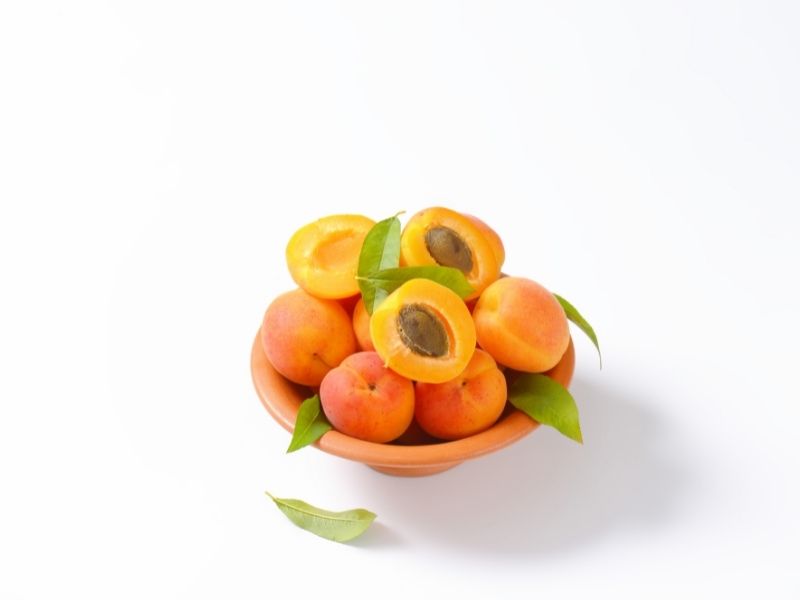
Is apricot good for dogs?
Yes, apricots are a healthy and nutritious snack for dogs, when eaten correctly – don’t forget to remove the stem, leaves, and pit! The flesh and skin of the apricot are both rich in vitamins, antioxidants, and fiber, and boast some pretty decent health benefits.
Health benefits of apricots
Apricots are a great source of the following:
Vitamins: Apricots are loaded with vitamins, including Vitamin A, Vitamin C, and Vitamin E. These vitamins can boost your dog’s immune system, reduce inflammation, improve the quality of the skin and coat, and support proper function of muscles and nerves.
These vitamins can also strengthen bone density. Vitamin A keeps eyes healthy, Vitamin C supports your dog’s immune system, and Vitamin E is critical to certain cell functions and metabolizing fat.
Fiber: Fiber promotes healthy bowel movements, colon health, and relieves your dog of constipation. It also aids in weight management.
Potassium: Potassium helps with muscle development, supports healthy kidney and heart function, and aids in maintaining healthy bone density.
Copper: Copper is critical to the formation of the skeletal system and assists in the prevention of anemia, since it helps the body metabolize iron.
Antioxidants: Antioxidants help fight free radicals, which are responsible for cellular and molecular damage. They can also protect the body from cancer. Apricots contain beta carotene, which helps prevent oxidative damage to cells.

Are apricots safe for dogs to eat?
As long as they are served correctly and in moderation, apricots are perfectly safe for dogs to eat.
Be sure to remove all stems, leaves, and the pit. Apricots are stone fruits, similar to peaches, cherries, and nectarines, and therefore have a pit (or stone) in their center, encased in a fleshy outer fruit.
The stone is toxic and contains trace amounts of cyanide. In addition to discarding the stone, it’s also a good idea to avoid the apricot stem and leaves. Eating the hard stone of an apricot also poses a choking hazard, and can cause intestinal blockage if swallowed.
For these reasons, apricots should never be fed whole to your dog. If you live near an apricot tree or visit an apricot orchard, keep an eye on your dog to ensure they don’t snag any fallen fruits.
If your dog has gotten into some whole fruits, you’ll have to monitor them closely for symptoms of cyanide poisoning. If your dog has somehow managed to eat many apricots, you may want to get proactive and take them to the vet right away.
If there is an issue, you will typically notice symptoms 15 to 20 minutes after your dog has ingested the apricots. Symptoms of cyanide poisoning in dogs can include shortness of breath, bright red gums, dilated pupils and lethargy. In some cases, cyanide poisoning can be fatal.
Fallen fruit may also have fermented or started to mold, which can be damaging to your dog as well.
All of that said, the skin and flesh of the apricot fruit itself is completely fine for your dog to eat, so as long as you’re careful and feed your dog in moderation, apricots are safe to enjoy!
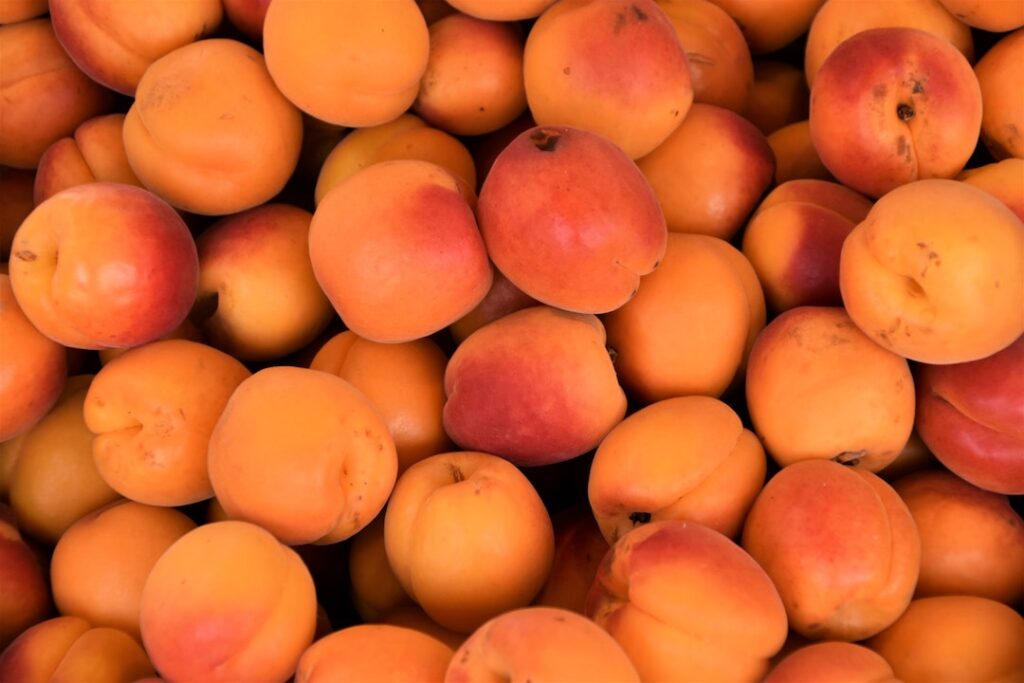
How much apricot can my dog eat?
Apricots are delicious, but it’s important that your dog doesn’t over indulge. Too much apricot can be detrimental to your dog’s health. Even though apricots may be a healthy snack, they should only be given to your dog in moderation.
Apricots are high in sugar and fiber, two things that can cause an upset stomach. While there’s no definitive rule on how much apricot your dog can eat, I like to follow the 90/10 rule when feeding my dog, whereby 90% of your dog’s calorie intake comes from balanced meals, and 10% comes from treats, like apricots and other fruits.
And don’t forget – always consult your veterinarian before introducing new snacks.
Can dogs eat apricot seeds?
The apricot seed, also known as the kernel, is located in the center of the apricot, where it’s encased in a hard shell called the pit, or stone. Dogs should never be permitted to eat apricot seeds, or the pits. The pit and seed should always be removed and placed somewhere far out of reach of your dog.
There are two ways in which apricot seeds are harmful for your dog. For one, they pose a choking hazard, especially when not chewed. If swallowed, the seed can cause internal blockage and gastrointestinal issues. Symptoms of intestinal blockage include vomiting, decreased appetite, and constipation. If you notice any of these symptoms, call your vet immediately.
Apricot seeds are also dangerous because they contain amygdalin, a poisonous compound known to release cyanide. If consumed in sufficient dosages, cyanide can do serious harm to your dog.
If your dog accidentally eats or swallows an apricot seed, look out for symptoms of toxicity, which could include: difficulty breathing, dilated pupils, fatigue, shock, and/or bright red gums. If you notice any of these symptoms, contact your vet immediately.
Can dogs eat apricot kernels?
An apricot kernel is another name for the seed of an apricot. It comes encased in a hard shell called the pit, or stone.
Apricot kernels are not safe for your dog to consume. Remove them from the fruit before feeding apricot to your dog, and place them in a secure location that’s well out of reach.
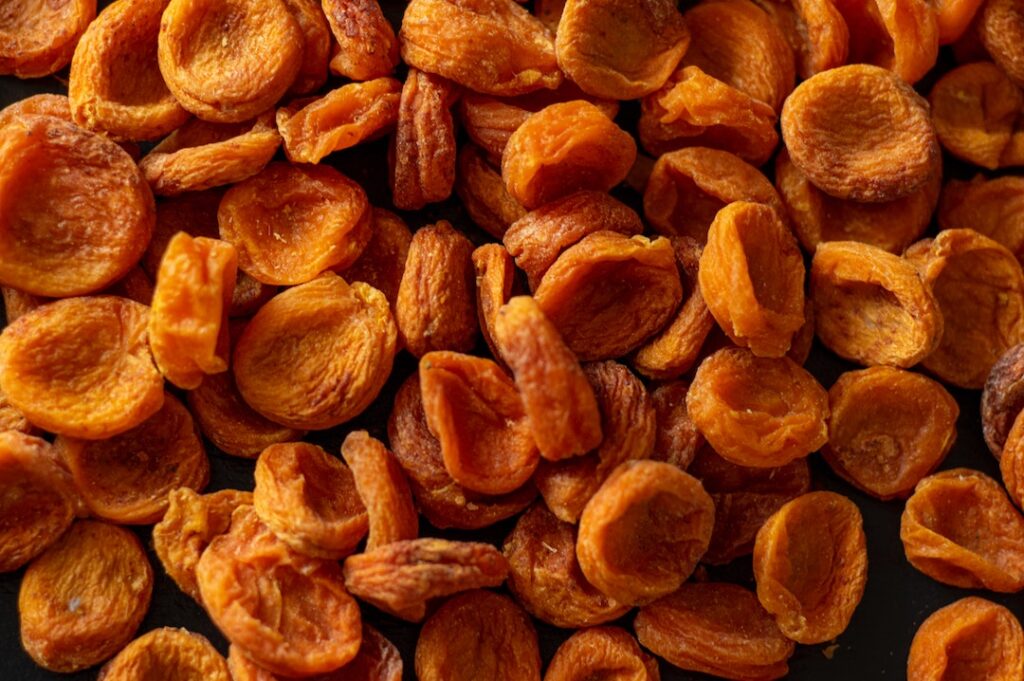
Can dogs eat dried apricots?
Yes, dogs can eat dried apricots, but only under certain conditions.
Dried apricots offer all of the same nutritional benefits found in fresh apricots. They typically come sliced with the stems, pits, and leaves removed, meaning they’re safe for consumption in reasonable quantities.
Just be sure that the dried apricots are an appropriate size for your dog, and, if necessary, cut them into pieces to avoid choking.
Also, keep in mind that dried fruits have a greater concentration of both calories and sugar, and sometimes even contain added sugars. As a result, you should feed your dog less than you would if the fruit was fresh. And, if the dried fruit does have added sugar, consider skipping it altogether – who needs those extra calories?!
If your dried apricot comes in a bag of mixed dried fruit or trail mix, be on the lookout for dangerous additions. These mixes frequently contain foods that are toxic to dogs, like chocolate, raisins, and certain nuts. Skip the mix and keep it for yourself.
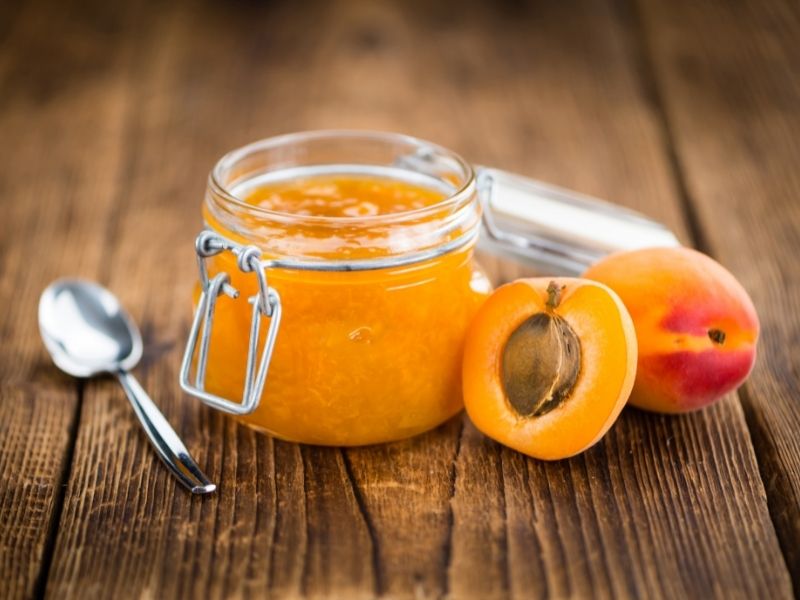
Can dogs eat apricot jam?
Apricot jam is delicious! There’s no doubt that your dog will want a lick or two. But it’s probably better to skip the apricot jam.
If made at home, apricot jam typically contains apricots, lemon juice, and lots of sugar. When store-bought, there might be added preservatives or artificial sweeteners like xylitol, which are toxic for dogs.
The high sugar content and additives have no nutritional value, and aren’t healthy for your dog. Forget the jam, and stick to fresh or dried apricots.

Can dogs eat apricot jelly?
Jam is often made with mashed fruit, whereas jelly is made with strained fruit juice. Jam is the chunkier version of jelly, with pieces of actual fruit in it. Just like jam, your dog will probably want a taste of delicious apricot jelly, but, similar to jam, you should skip the jelly. The added sugar isn’t good for your dog.
Can dogs eat apricot yogurt?
It depends! Store-bought apricot yogurt usually contains artificial flavors and preservatives, which can be bad for your canine companion. It might even contain artificial sweeteners like xylitol, which can be toxic for dogs. Those sugary store-bought yogurts are a less nutritious form of eating apricots, with little nutritional value.
If you want to feed your dog apricot yogurt, the best option is to prepare it yourself. Combine plain yogurt with organic apricot purée or mashed apricots for a dog-friendly version. Be sure to give your dog a little bit of yogurt first to see how they handle it.
Feed the homemade yogurt to your dog in moderation. You can have them to lick it, add it to a Kong, or freeze it in ice cube trays.
Can dogs have apricot nectar?
Apricot nectar is basically apricot juice. It’s often made using three basic ingredients: fresh apricots, sugar, and lemon juice. Fresh mint or basil might be added too, if you’re lucky.
Since there’s a good amount of added sugar, apricot nectar is not suitable for dogs. Stick to fresh apricots!

Can dogs eat apricot skin?
Yes, dogs can eat apricot skin. The sometimes fuzzy, sometimes smooth skin of an apricot contains most of the dietary fiber in the fruit.
Just be sure to wash and rinse the apricot, so any dirt and pesticides are cleaned off, and cut the skin into bite-sized pieces so your dog doesn’t choke.
Can dogs eat canned apricots?
Preserved or canned apricots are typically high in added sugars and contain preservatives. This is especially true of apricots canned in syrup. Both of these additives can be harmful for your dog.
Some canned apricots may also contain artificial sweeteners, such as xylitol, which is poisonous to dogs.
Your dog doesn’t need the extra sugar, or the calories, so keep the tinned apricots for yourself.
Can dogs eat apricot cheese?
Some cheeses are blended with dried apricots to combine the sweet, fruity flavor of apricot with the mild, savory flavor of cheese. It’s a winning combination!
These decadent cheeses make a great snack, and can be found in salads, sandwiches, and on cheese boards.
The cheeses are definitely delicious, and of course, many dogs love cheese. If your dog has a history of eating cheese, and is able to tolerate dairy (often pasteurized cow’s milk) then feeding them a small piece of apricot cheese should be ok.
Monitor them after giving them a taste – remember, always in moderation! As always, speak to your veterinarian before introducing your dog to new foods.
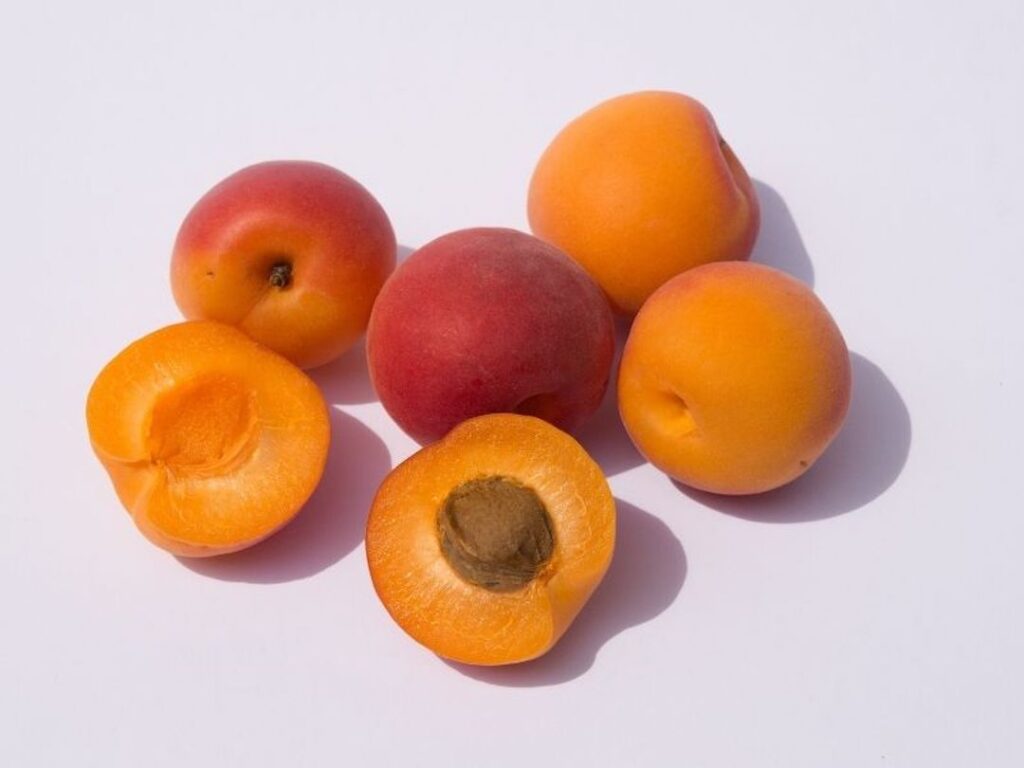
How to feed a dog apricots:
Preparing apricots for your dog’s consumption is easy! There are only a few things to keep in mind to avoid hazards. As always, always check with your veterinarian before introducing a new food to your dog, and don’t forget to get their recommendation on serving size.
To safely serve apricots to your dog, do the following:
- Remove the stem and all of the leaves. Don’t feed these pieces to your dog, compost them instead!
- Wash and rinse the apricot. Rinse the apricot thoroughly to wash off any bacteria, pesticides, or dirt. This is especially important if your apricot is not organic.
- Cut the apricot in half and remove the pit. Be sure to compost or trash the pit in a place that’s away from your dog’s reach.
- Cut the apricot into bite-sized pieces. Avoid the risk of choking by cutting the apricot into pieces, like small cubes or slices. Remember to size them appropriately, so your dog doesn’t have trouble chewing, and to prevent choking.
- Enjoy! Supervise your dog as they consume the juicy, delicious treat.
If you’re looking for additional ways to add apricots to your dog’s diet, try one of these ideas. Your dog will thank you for it.
- Frozen: Freeze the apricot to make a refreshing, tasty snack. You can freeze apricot in thin slices, in cubes, or in an ice cube tray with yogurt. Perfect on a hot summer day!
- Food Topper: Liven up any meal with apricot as a food topper. It’s a simple way to serve your dog apricot – sprinkle bite sized pieces in their food dish.
- Puréed: Puréeing apricot will make it easy for senior dogs, and those with few teeth, to eat. It’ll also make mixing the sweet treat with other foods – like yogurt or dog kibble – easy. Try it in a Kong!







